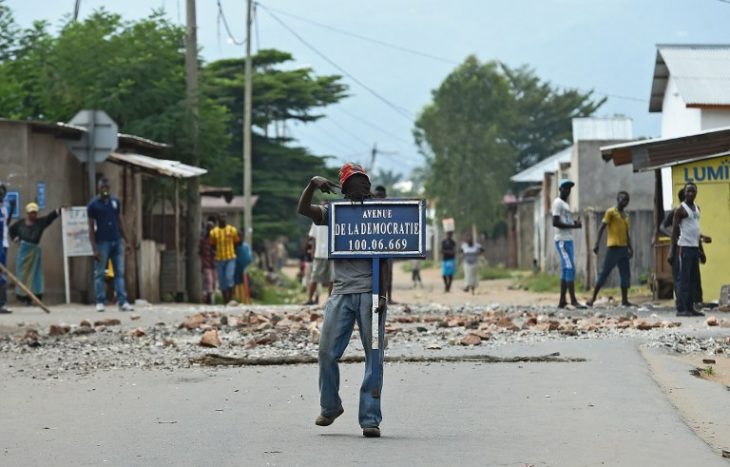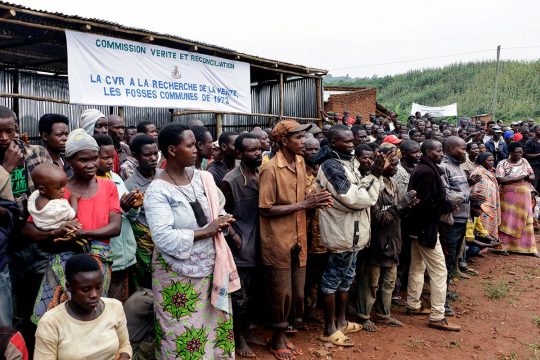Burundian university professor René Claude Niyonkuru, a trained lawyer and human rights activist, fears President Pierre Nkurunziza’s stubborn desire to run for a third term despite massive internal protest could plunge Burundi back into civil war. In this interview, he talks to JusticeInfo.Net about the crisis in his country.
JusticeInfo.Net: Do you think Burundi is heading for a new long-term crisis? Could the protests continue even after an electoral victory for Pierre Nkurunziza?
René Claude Niyonkuru: Despite all the calls from Burundians and from the international community for President Nkurunziza to withdraw his bid for a third mandate in the interests of the country’s stability, this now seems very unlikely. He did not take advantage of any of the opportunities he had to do so, I think deliberately. (…) If he is re-elected through an electoral process increasingly seen as a kind of political whitewash of a longstanding anti-democratic intention to hang on to power, we risk seeing more repression of the political opposition, civil society and media. The greater the repression, the greater the risk that the opposition will also resort to force. And that could trigger a spiral of violence. Many national and international players fear the country could fall back into civil war and are calling for more restraint on the internal front and vigilance on the part of the international community. There are lots of warning signs, but we all hope the country will not get to that.
JusticeInfo.Net : Isn’t there a risk that the current crisis could revive ethnic hatred or increase the tensions between Hutus and Tutsis?
RCN: A more objective analysis of the current political crisis shows clearly that the current problems go way beyond ethnic factors. It’s a political crisis against the background of bad political and economic governance, massive violation of civil and individual liberties, monopoly of power by a single political party and so on.
At the same time, we should not underestimate the temptation to turn the crisis into an ethnic one. The people in power seem at the moment to be tempted by this, minimizing the opposition movement by claiming it is driven by the Tutsi minority. Since the start of demonstrations, there have been insinuations and even open speeches by people in power seeking to persuade the public that the opposition movement is Tutsi and making reference to the alleged mono-ethnicity of the areas that have seen most demonstrations. But clearly all ethnic groups are taking part in the demonstrations. Hutus who have taken part have even been presented as traitors in certain parts of the country.
JusticeInfo.Net: The coup attempt revealed divisions in the new Burundian army. What are the reasons for this division? Are they ethnic, regional, or for another reason?
RCN: The trust being built up within the army in the last few years is at risk of being damaged and making it more politically and ethnically divided. Some people associate the loyalists with the former CNDD-FDD fighters, and the putschists with members of the former government army, whereas the soldiers that attempted the coup were from all sides, including ex-rebels and ex-government soldiers.
The way this coup attempt is handled will be crucial. If there is a judicial case that enables individual responsibilities to be clearly established, serenity could quickly return to the army. If, on the other hand, the government engages in a witch hunt along ethnic or regional lines, deeper divisions are to be feared, which could even in the long term lead to the disintegration of the army, whereas up to now it has been regarded as a model for reconciliation and a pillar of political stability in Burundi.
JusticeInfo.Net: How can the international community help resolve the crisis?
RCN: On that point, I have more questions than answers. We have seen in the past lots of bungled attempts and lengthy hesitations in such situations before strong decisions were taken such as political and/or economic sanctions and a peacekeeping force. The case of Rwanda in 1994 showed incredible failings on the part of the international community.
We also should not forget that the international community often comes to support initiatives that are already being taken on an internal level. And that is where the current challenge lies. I would like to see internal initiatives to resolve this crisis, which unfortunately are slow to materialize and to be consolidated.
JusticeInfo.Net: What can Burundians expect from the Truth and Reconciliation Commission?
RCN: We cannot expect much of the Truth and Reconciliation Commission – recently set up – in the resolution of this crisis, or even in the process of truth seeking and reconciliation for all Burundians. In fact, its creation was one of the symptoms of the break in trust between national players, since it does not have the support of opposition parties or civil society. Its composition, with the exception of a few individuals that have wide support, also reflects the ruling party’s desire for control. The Commission has been given a mandate that deliberately excludes any judicial proceedings, whereas there is a vital need for justice in a country that has suffered numerous cycles of violent conflict. These weaknesses alone make the Commission unlikely to achieve its mission and even less likely to be able to help defuse the current crisis.
JusticeInfo.Net: So what is the solution to the current crisis?
RCN: I would argue for a frank and honest political dialogue that could clear the socio-political atmosphere to prepare elections. I also think the elections should be postponed if we want them to be inclusive and credible. The political players need to commit to reconsidering their positions, including on the controversial candidacy of the current president and on the thorny issue of individual and civil liberties. The political opposition, media and civil society must be able to play their role freely. Progress on peace and security, individual and collective freedoms, economic progress and the stability of the country in general should not be sacrificed to the selfish interests of political leaders, whatever legitimacy they may claim or whatever the legality of the texts on which they try to seek or maintain power. The people of Burundi aspire to better.







